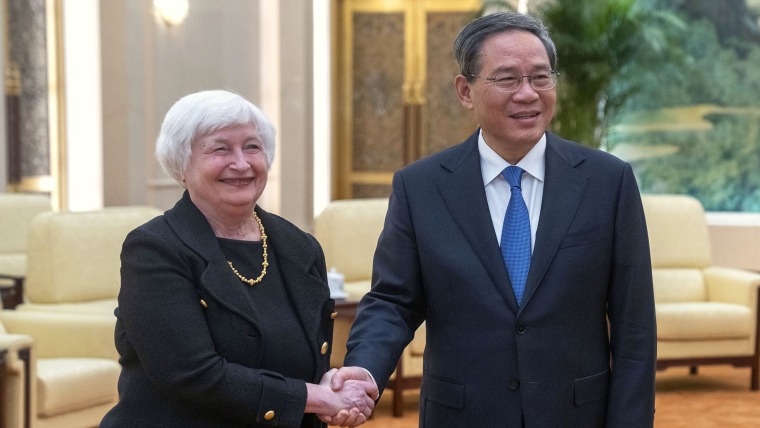[ad_1]
On the heels of a trip to Beijing, U.S. Treasury Secretary Janet Yellen is back in India for the third time in nine months, this time to meet finance ministers from the Group of 20 nations about global economic challenges like the increased threat of debt defaults facing low-income countries.
Yellen told reporters in Gandhinagar, the capital of the western Indian state of Gujarat, on Sunday that she was trying to foster warming relations between the U.S. and India. She also plans a stop in Hanoi, Vietnam, to address supply chain reliability, clean energy transition and other matters of economic resilience.
Yellen said her goals for her time in India were to press for debt restructuring in developing countries in economic distress, push to modernize global development banks to make them more climate-focused and deepen the ever-growing U.S.-India relationship.
Yellen’s frequent stops in the country signal the importance of that relationship at a time of tension with China.
India’s longstanding relationship with Russia has also loomed as the Kremlin’s invasion of Ukraine continues despite U.S. and allied countries’ efforts to sanction and economically bludgeon Russia’s economy. India has not taken part in the efforts to punish Russia and maintains energy trade with that country despite a Group of Seven agreed-upon price cap on Russian oil, which has seen some success in slowing Russia’s economy.
Yellen said ending the war in Ukraine “is first and foremost a moral imperative. But it’s also the single best thing we can do for the global economy.”
She added the U.S. would continue to cut off Russia’s access to the military equipment and technologies that it needs to wage war against Ukraine.
“One of our core goals this year is to combat Russia’s efforts to evade our sanctions. Our coalition is building on the actions we’ve taken in recent months to crack down on these efforts,” Yellen said.
The U.S. increasingly relies on India and has courted its leaders.
She said the U.S. sees India as an indispensable partner in its friend-shoring strategy for increasing the resilience of supply chains.
She added private U.S. firms sees India as an excellent place for producing goods and exporting to the United States.
She also noted that slowing growth in China has impacted growth in many other countries.
“It is something I discussed with my Chinese counterparts. I think the Chinese are anxious to communicate that their business environment is open. There is a desire certainly to see foreign investment,” Yellen said.
President Joe Biden hosted a White House state visit honoring Indian Prime Minister Narendra Modi in June, designed to highlight and foster ties. The two leaders pronounced the U.S.-India relationship never stronger and rolled out new business deals between the nations.
Raymond Vickery Jr., a policy expert on U.S.-India relations at the Center for Strategic and International Studies, said Yellen’s coming to India shortly after visiting China is meaningful in that Indian officials “are going to want to know in great detail what happened in the meetings with her Chinese counterparts and see where it fits with their perspective on economic relations with China.”
“They’re going to want to know whether or not the United States is serious about moving some of its sourcing activity from China to India.”
A senior Treasury official, speaking on condition of anonymity to preview Yellen’s trip, said there was hope that debt treatments for Ghana and Sri Lanka will be discussed and completed quickly at the meetings.
Sri Lanka and Ghana defaulted on their international debts last year, roughly two years after Zambia defaulted. And more than half of all low-income countries face debt distress, which hurts their long-term ability to function and develop.
Last month, Zambia and its government creditors, including China, reached a deal to restructure $6.3 billion in loans, on the sidelines of a global finance summit in Paris.
The agreement covers loans from countries such as France, the U.K., South Africa, Israel and India as well as China — Zambia’s biggest creditor at $4.1 billion of the total. The deal may provide a roadmap for how China will handle restructuring deals with other nations in debt distress.
Yellen’s trip comes shortly after she spent a week in China, meeting the nation’s finance ministry and discussing mutual trade restrictions and national security concerns.
Harold W. Furchtgott-Roth, a senior fellow at the Hudson Institute, said Yellen’s trip to India “is a reflection of a naturally developing alliance.”
“India has a great deal of tension with China — they have constant border disputes,” he said.” And India wants to develop and has developed into sort of an Indian Ocean naval power, which is also a region that China wants to develop.”
[ad_2]
Source link





















